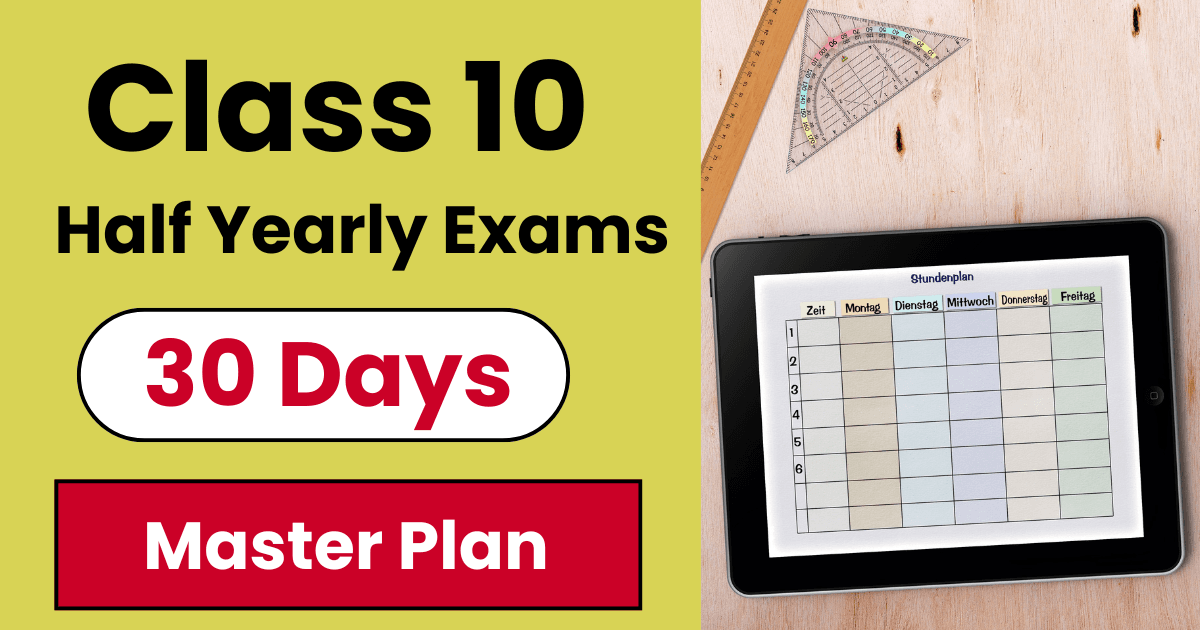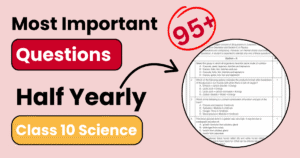Class 10 half-yearly exams are coming soon. And, if you are in Class 10, you already know that this phase is very important. But don’t worry, they are not as scary as they sound. Think of them as practice before your board exams. These exams help you know how much you’ve learned and what areas need more work.
Now, you might be thinking: “Can I really prepare well in just 30 days?” The answer is YES! This guide offers a clear, manageable 30-day plan with subject-wise strategies, a daily routine, and smart revision tips to make your preparation focused, stress-free, and even enjoyable. Class 10 is not just about studying—it’s also your last year to enjoy with childhood friends, so balance is key!
How to Use These 30 Days
- First 15 Days → Complete syllabus coverage & notes making
Revise each chapter, highlight key points, and create concise notes in your own words. Cover every topic systematically. - Next 10 Days → Strong revision + solving sample papers
Revise from your notes and practice at least 1–2 sample papers every day to test yourself. - Last 5 Days → Final review, memory hacks, and light preparation
Go through formulas, diagrams, maps, and key terms. Don’t start anything new, just revise and keep yourself calm.
Subject-wise 30-Day Strategy
Mathematics
Math becomes easy when your concepts are clear and you practice regularly. If you give time every day, even one chapter a day is enough to cover everything on time.
First 15 Days:
- Revise one chapter daily from NCERT (including examples).
- Maintain a formula & theorem notebook.
- Solve all NCERT exercise questions (they come directly in exams).
- Practice 15–20 problems daily to build speed and accuracy.
Next 10 Days:
- Practice previous year papers.
- Solve sample papers under 3-hour conditions.
- Revise weak areas (especially Trigonometry, Probability, Geometry).
- Revisit solved examples from NCERT
Last 5 Days:
- Go through formulas daily.
- Revise solved examples, don’t start anything new.
Smart Hack: Try writing formulas on sticky notes and putting them near your study table. Seeing them daily helps retention.
If you find it difficult to cover Mathematics from NCERT, visit this YouTube channel for detailed and concise explanation of NCERT Books: CBSE Guidance
Science (Physics, Chemistry, Biology)
Science is not just about reading. It’s about understanding facts, remembering key points, and drawing neat diagrams. If you balance all three, Science becomes much easier and more interesting.
First 15 Days:
- Physics: Revise derivations and practice formula-based numericals.
- Chemistry: Memorize equations, reactions, and properties of metals and non-metals. Note color changes in precipitation reactions on a chart.
- Biology: Focus on diagrams, definitions, and processes (e.g., photosynthesis, respiration). Practice labeling diagrams.
- Read NCERT thoroughly; it’s the backbone of most questions.
Next 10 Days:
- Solve sample papers section-wise (Physics, Chemistry, Bio separately).
- Revise important NCERT questions, as many exams are lifted directly and practice writing answers in bullet points.
- Write answers instead of just reading.
- Refer to Class 10 Notes and Class 10 Important Questions & Answers for concise chapter summaries and extra questions.
Last 5 Days:
- Revise equations, diagrams, and key terms daily.
- Do not attempt lengthy numericals; stick to concepts.
Smart Hack: Create a “Science Wall” with charts for Physics formulas, Chemistry reactions, and Biology diagrams. Bookmark tricky NCERT pages (e.g., Carbon and Its Compounds) for frequent review. Don’t fear sample papers—they boost confidence!
Social Science
This subject looks bulky, but if you break it into small parts like stories, important dates, and maps, it becomes very easy to study.
First 15 Days:
- History → Create a timeline of events. Revise through flowcharts.
- Civics → Memorize constitutional terms and chapter themes (e.g., democracy, federalism).
- Geography → Practice map-pointing daily; use mnemonics (e.g., BRUM = Bajra: Rajasthan, Uttar Pradesh, Maharashtra).
- Economics → Revise definitions and understand the concept of development and sectors of the Indian economy; read NCERT once thoroughly.
Next 10 Days:
- Solve the last 5 years’ question papers (e.g., CBSE Last Years’ Solved Papers).
- Write answers in bullet points for clarity; include relevant diagrams or flowcharts.
- Focus on case studies and map-based questions.
Last 5 Days:
- uick review of dates, events, maps, and keywords.
- Practice map-pointing with blank maps.
Smart Hack: Summarize History chapters like stories and use mnemonics for Geography. For vague questions (common in Geography), write relevant points confidently—examiners often reward creativity.
English (Language + Literature)
Many students ignore English, but if you prepare it well, it can actually increase your overall percentage.
First 15 Days:
- Grammar → Revise one grammar rule daily (tenses, voice, narration, prepositions).
- Writing → Practice at least 1 letter/report daily.
- Literature → Read every story/poem; summarize themes and key quotes in 3–4 bullet points. Must see Class 10 English Important Q&A Chapterwise for tough chapter questions to practice creative answers.
| English Grammar & Writing Class 10 Determiners Tenses Modals Subject-Verb Agreement Reported Speech Class 10 Letter Writing: Format, Examples & Practice Analytical Paragraph Writing: Format &Tips |
Next 10 Days:
- Attempt at least 3 full English sample papers.
- Do comprehension passages for speed.
- Prepare summary points for each poem/story.
Last 5 Days:
- Revise grammar rules.
- Go through all your writing samples.
- Quick review of important quotes and themes.
Smart Hack: For formal letters, memorize professional intros/conclusions to sound polished. For literature, discuss stories/poems with friends to generate unique answer ideas—examiners love creative, relevant points.
Sample Daily Routine (Adjust to Your Timings)
| Time | Activity |
| 6:30 AM – 7:30 AM | Quick recall (formulas/definitions/diagrams) |
| 8:00 AM – 11:00 AM | Focus subject (Maths: 1.5 hours, Science: 1.5 hours) |
| 11:30 AM – 1:00 PM | Social Science (one topic) |
| 2:30 PM – 4:00 PM | English practice |
| 5:00 PM – 7:00 PM | Solve sample papers or revise weak topics |
| 7:30 PM – 9:00 PM | Mixed revision (charts, sticky notes, flowcharts) |
| 9:00 PM – 9:30 PM | Light review (quick glance at notes) |
Tip: Take a 5-minute walk or stretch every 45–60 minutes to stay refreshed. Schedule 30–60 minutes daily for fun (e.g., music, friends) to keep your spirits high.
How do I stay motivated and avoid feeling overwhelmed in these 30 days?
Set small, daily goals (e.g., “Solve 15 Maths problems today”) and reward yourself with a treat, like a favorite snack or a quick chat with friends. Visualize acing your exams and remind yourself: “Pain is temporary, glory is forever!” Enjoy small moments—Class 10 is your last year as a kid, so balance fun and studies.
What if I haven’t studied much before these 30 days?
No stress—30 days is enough to make a huge difference! Stick to NCERT, as it covers 90% of exam questions. Focus on high-weightage chapters (check past papers) and follow the sample routine. Start today with determination—“kal kabhi nahi aata” (tomorrow never comes)!
How can I manage exam pressure and stay calm?
Take short breaks every 45–60 minutes (e.g., a quick walk or deep breathing). Get 7–8 hours of sleep to keep your mind sharp. Don’t aim for perfection—focus on doing your best. On exam day, stay relaxed; nervousness causes silly mistakes. Wake up with determination, sleep with satisfaction!
Are YouTube videos or online resources helpful in the last 15 days?
Yes, one-shot videos (e.g., from CBSE Guidance) can clarify concepts quickly, especially for Science or Maths. Combine them with NCERT reading and sample papers. Download important question PDFs from here: Class 10 Important Q&A
Complete 30-Day Calendar (Ready-to-Follow)
| Days | Focus | What to Do |
| Day 1–15 | Syllabus Coverage | Revise each subject chapter-wise, make notes, highlight key points. |
| Day 16–20 | Practice Papers Start | Solve 1 sample paper every 2 days (Maths, Science, English). |
| Day 21–25 | Mixed Revision | Revise Social Science maps, dates + Science diagrams + Maths formulas. |
| Day 26–27 | Full Mock Test | Attempt complete 3-hour papers at home (Maths + Science). |
| Day 28 | Weak Spot Revision | Only revise topics where you still make mistakes. |
| Day 29 | Quick Notes Only | Go through notes, formulas, diagrams, sticky notes. |
| Day 30 | Chill & Light Revision | Light review, sleep early, keep mind fresh. |
Quick Exam-Day Hacks
- Read the question paper fully in 15 minutes.
- Attempt the easy questions first.
- Keep the last 10 minutes for revision.
- Write answers neatly because presentation matters.
- Stay calm; panic wastes marks.
Final Words
30 days may feel short, but it’s more than enough if you use them wisely. Think of your half-yearly exams as a trial run before the boards. They give you a chance to build confidence, practice time management, and find out which areas you still need to improve.
The key is not to study harder, but to study smarter. Revise daily, practice regularly, and stay consistent. Remember, last-minute panic never helps, but steady preparation always does. Stay calm, trust your effort, and go give your best. You’ve got this!




